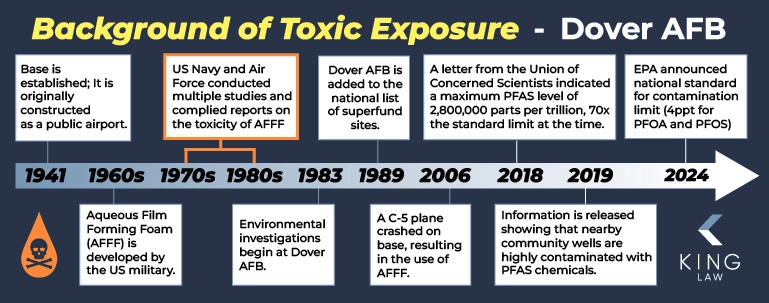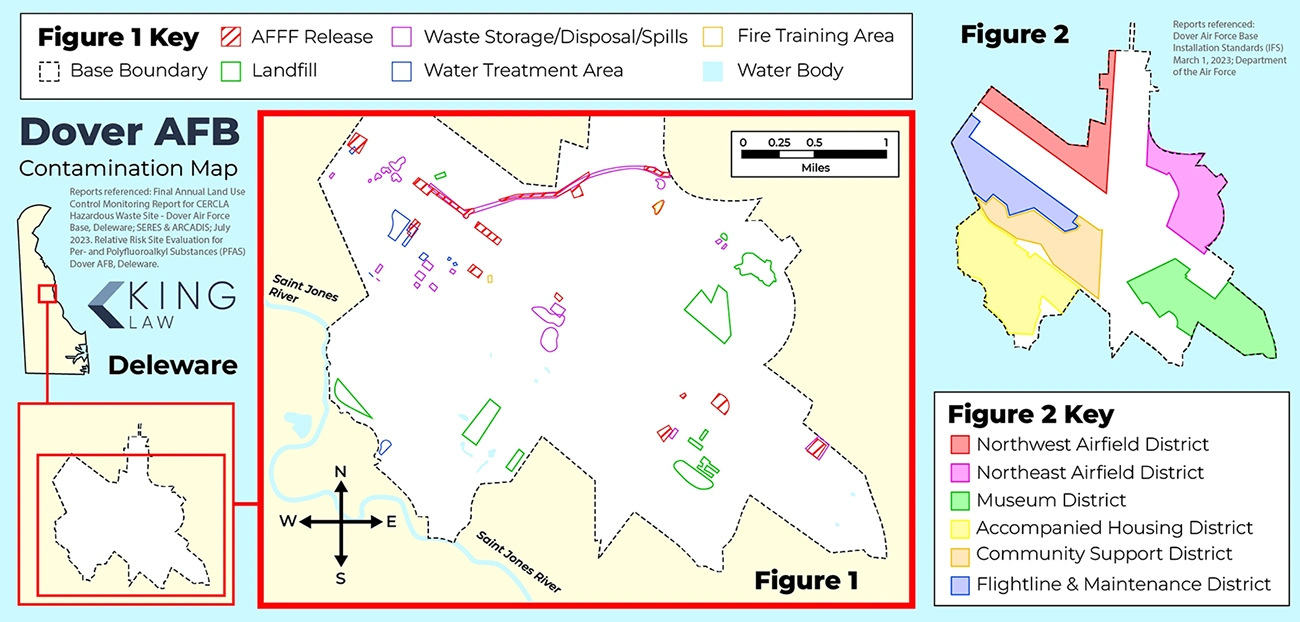
Dover AFB Water Contamination Lawsuit Overview
While initially constructed in 1941 as a municipal airport for the city of Dover under the name Dover Airdrome, the base would play a critical role in military operations during WWII. Within days of Pearl Harbor, units from the base were ready for assignment. Today, Dover Air Force Base is home to the 436th Airlift Wing (“Eagle Wing”) and the 512th Airlift Wing (“Liberty Wing”). It also houses the C-5 Galaxy and C-17 Globemaster III, military cargo planes that conduct missions worldwide.
Over 11,000 people, including approximately 3,900 active-duty airmen and 1,500 reservists, call the base home. Recently, the base has come under scrutiny as elevated levels of per- or polyfluoroalkyl substances (PFAS) were found in the groundwater at the base and drinking water supplies of nearby communities. Contamination, however, at the base is not new. In 1989, the site was added to the Superfund program’s National Priorities List (NPL). Cleanup efforts continue at the base to help mitigate the damages caused by potentially toxic substances.
Individuals who were stationed at Dover Air Force Base and were subsequently diagnosed with a PFAS-related condition, such as thyroid disease or certain kinds of cancer, may have a valid claim for compensation. King Law is actively supporting and investigating affected individuals in Dover Air Force Base water contamination lawsuits. Contact our office today to schedule a free, no-obligation consultation.
Dover AFB Water Contamination Lawsuit Updates
April 21, 2024: Dover Air Force Base Named Superfund Site Due to Extensive Groundwater Contamination
Dover Air Force Base has been designated as a Superfund site by the United States Environmental Protection Agency. The base has over a dozen chemicals in the groundwater. Chemicals include Trichloroethane, Dichloroethane, Arsenic, Benzene, and Toluene. In addition, PFAS was discovered in the water on the base in 2014, and in the surrounding area a short time later.
April 2024: Investigations continue into the water contamination at Dover Air Force Base. Individuals who have been affected by PFAS exposure are strongly encouraged to consult with an attorney to determine the best course of action.
March 2023: The Environmental Protection Agency (EPA) announced a proposed National Primary Drinking Water Regulation (NPDWR) for six PFAS. Under the new guidance, the proposed Maximum Contaminant Level (enforceable) for PFAS would be lowered from 70 parts per trillion to 4 parts per trillion.
February 2022: As reported by the Associated Press, blood tested by the Agency for Toxic Substances and Disease Registry taken from people living near the base show higher levels of PFAS contamination compared to the national average.
February 2020: Samples taken from two additional wells located near Dover Air Force Base indicate PFAS levels above the federal advisory level of 70 parts per trillion. One well showed a PFOS level of 168,000 parts per trillion and a PFOA level of 2,460 parts per trillion.
July 2019: Testing indicates that four private drinking water wells located near Dover Air Force Base have levels up to 2,400x the federal lifetime health advisory set by the Environmental Protection Agency (EPA) at the time of 70 parts per trillion. It is believed that the PFAS contamination is the result of the military’s use of AFFF, a fire-fighting foam known to contain these potentially cancer-causing chemicals.
On this page:
Background of Toxic Exposure at Dover Air Force Base
Dover AFB Water Contamination Map
Contaminants Found in Dover AFB Drinking Water
Current Water Quality at Dover Air Force Base
Health Risks Linked to Drinking Water at Dover AFB
Eligibility Criteria for Filing a Dover AFB Water Contamination Lawsuit
Dover AFB Water Contamination Settlement and Payout Amounts
How to File a Dover AFB Water Contamination Lawsuit
Statute of Limitations for Dover AFB Water Contamination Claims
Background of Toxic Exposure at Dover Air Force Base
According to the Environmental Protection Agency (EPA), environmental investigations at Dover Air Force Base began in 1983. Testing at the site, dating back to at least 1986, indicated that the level of multiple potentially harmful contaminants found in the drinking water, groundwater, and surface water at the site exceeded state and federal health criteria. The base was added to the Superfund program’s National Priorities List (NPL) in March of 1989.
Substantial testing for PFAS was initiated on the drinking water and groundwater on and off base in 2014. Concerns over the potential for PFAS contamination grew because of the military’s widespread use of Aqueous Film Forming Foam (AFFF). The film is known to contain PFAS and was used at Dover Air Force Base for training purposes and to combat petroleum-based fires.
In 2018, a letter from the Union of Concerned Scientists indicated that there was a maximum PFAS level of 2,800,000 parts per trillion detected on the base. A year later, the base released information showing that at least four wells that supply drinking water to nearby communities were contaminated with high levels of “forever chemicals.” Continued monitoring and testing over the next several years revealed additional wells that showed contamination.

Dover AFB Water Contamination Map

Contamination is believed to be present throughout Dover Air Force Base; however, certain areas have been specifically targeted for cleanup due to the levels of contamination. Due to the base’s use of AFFF, substantial contamination is being investigated in and around Fire Training Areas. Additional areas of contamination include several wells located on- and off-base. The four wells identified in 2019 with elevated PFAS levels were located to the east of the site.
Contaminants Found in Dover AFB Drinking Water
There have been several contaminants found in drinking water and groundwater at Dover Air Force Base. While the primary contaminants are “forever chemicals” known as PFAS, other toxic substances such as volatile organic compounds (VOCs) and metals were also found at the site.
Toxic substances found in the soil, drinking water, or groundwater at Dover Air Force Base:
- PFAS
- Dichloroethane
- Volatile organic compounds (VOCs)
- Polychlorinated biphenyls (PCBs)
- Oil and grease (O&G)
- Phenols
- Cyanide
- Arsenic
- Cadmium
- Chromium
- Copper
- Iron
- Lead
- Mercury
- Nickel
- Silver
- Zinc
- Total organic carbon (TOC)
- Total organic halogens (TOX)
While testing continues in the groundwater on the base and at nearby wells that may have been contaminated from runoff or migration from the site, it is known that many of these substances have devastating effects on humans and the environment. PFAS exposure has been linked with a number of adverse health conditions, including an increased risk of developing certain kinds of cancer.
Current Water Quality at Dover Air Force Base
According to the Air Force, testing of Tidewater Utilities, which supplies drinking water to Dover Air Force Base, showed perfluorooctanesulfonic (PFOS) and perfluorooctanoic (PFOA) acids of less than 2 parts per trillion. New EPA guidance lowers the enforceable Maximum Contaminant Level of PFAS to 4 parts per trillion. However, the EPA is also proposing health-based Maximum Contaminant Level Goals of zero parts per trillion.
Water Treatment Efforts at Dover Air Force Base
Water treatment efforts continue at Dover Air Force Base. Institutional controls remain in place that provide activity and use limitations. The goal of the institutional controls is to reduce exposure to contamination.
Due to the contamination levels on the base, the site remains on the National Priorities List (NPL). The final remedy is not expected to be selected until between September and November 2026.
In 2021, the installation of whole-house water filtration systems was completed at Dover Air Force Base. The Air Force continues to work with the EPA in accordance with Comprehensive Environmental Response, Compensation and Liability Act (CERCLA) regulations.
Health Risks Linked to Drinking Water at Dover AFB
PFAS exposure has been linked with a number of known health risks. Depending on the duration of exposure, individuals may have an increased risk of developing certain kinds of cancer. Individuals who were stationed or worked at Dover Air Force Base (or another qualifying base) for 6 months or more are strongly encouraged to engage in regular health check-ups and screening programs. Early detection of a PFAS-related condition is often critical.
Potential health risks associated with PFAS exposure:
- Thyroid cancer
- Liver damage
- Testicular cancer
- Prostate cancer
- Kidney cancer
- Low birth weight
- Developmental effects or delays in children
- Accelerated puberty
- Reduced immune response
- Reduced vaccine response
- Endocrine harms
- Cardiovascular disease
- Obesity
- Diabetes
- Gestational hypertension
- Gestational diabetes
- Changes in cholesterol
- Changes in liver enzyme levels
- Thyroid problems
Our law firm is currently evaluating cases where individuals have been diagnosed with:
- Kidney Cancer
- Liver Cancer
- Prostate Cancer
- Testicular Cancer
- Thyroid Cancer & Thyroid Disease
- Ulcerative Colitis
If you have been diagnosed with one of these or another condition related to PFAS exposure after being stationed on Dover Air Force Base, you may be entitled to compensation. It is essential to work with an attorney to determine whether you meet the eligibility criteria for filing a claim.
Eligibility Criteria for Filing a Dover AFB Water Contamination Lawsuit
To file a Dover Air Force Base water contamination lawsuit, you must meet several eligibility criteria. The best way to determine whether you meet the requirements is to consult with an attorney as early in the process as possible.
First, you must demonstrate that you were diagnosed with a condition related to contaminated water at the base. Second, you will need to show the duration of exposure. A minimum duration of exposure of 6 months is typically required for a water contamination lawsuit. Finally, you will need to prove that the illness you were diagnosed with is related to water contamination at the base.
Our law firm is currently evaluating cases where individuals have been diagnosed with:
- Kidney Cancer
- Liver Cancer
- Prostate Cancer
- Testicular Cancer
- Thyroid Cancer
- Thyroid Disease
- Ulcerative Colitis
Legal evaluation is often critical for assessing the potential for pursuing a claim and determining the value of your case. It is important to note that water contamination lawsuits can frequently last several months to a year or more. Working with an attorney immediately after a diagnosis can help ensure you meet all necessary criteria and help set realistic expectations for the timeline and outcome of the case.
Dover AFB Water Contamination Settlement and Payout Amounts
Settlement and payout amounts in Dover Air Force Base water contamination lawsuits are expected to vary substantially depending on the individual circumstances of the case. Previous cancer-related lawsuits, however, often settled within the $100,000 to $300,000 range.
Most settlements are anticipated to be between $30,000 and $500,000. The average settlement may hover around $250,000 with individuals who are younger at the time of diagnosis potentially receiving higher compensation. Extended duration of active illness or proof of significant toxic exposure may also result in a larger financial recovery. It is expected that some cases will have the potential to reach values at or near $1,000,000.
Claims with minor injuries or those with less proof of connection to the water contamination at the base might see values between $30,000 and $75,000. In general, settlements are lower than potential trial verdicts. However, there is no guarantee that a trial will have a successful outcome.
How to File a Dover AFB Water Contamination Lawsuit
There are several steps to file a Dover Air Force Base water contamination lawsuit. First you must collect documentation linking your exposure to contaminated water at Dover Air Force Base to your health problems. This may include medical records showing your PFAS levels and diagnoses of related illnesses, base housing agreements or utility bills proving residency, and any communication with the Air Force regarding the contamination.
PFAS lawsuits are complex and can be hard to navigate alone. It is crucial to have an attorney experienced in environmental torts and military base litigation on your side to advise you on your eligibility to sue and help guide you through the specific legal considerations surrounding military base cases.
PFAS lawsuits are a relatively new area of law. Courts are still developing legal precedents regarding exposure standards and causation. An attorney specializing in these cases will understand the nuances of PFAS litigation and how they apply to your situation at Dover Air Force Base.
Evidence to Support Your Claim:
There are several pieces of evidence that may be necessary to support your claim. It is important to retain all documents related to your case.
Evidence that may support your Dover Air Force Base water contamination case:
- Military orders
- Medical bills
- Physicians’ statements
- Referral to specialist
- Expert testimony
- Environmental studies
Statute of Limitations for Dover AFB Water Contamination Claims
All Dover Air Force Base water contamination claims are subject to a state-specific statute of limitations. A statute of limitations is a specific timeframe within which a person must file their claim in order to qualify for compensation.
Due to the varied statute of limitations for these cases, it is important to consult with an attorney as soon as possible to enhance the likelihood of a successful claim.
Dover Air Force Base Water Contamination Lawyers
Were you diagnosed with a PFAS-related condition after being stationed at Dover Air Force Base? You may be entitled to compensation. Contact King Law to discuss your case with an attorney. At King Law, we will work with you to ensure you receive the best possible outcome in your case. Our lawyers have extensive experience helping victims of military water contamination secure compensation. Contact our office today to schedule a free, no-obligation consultation.

